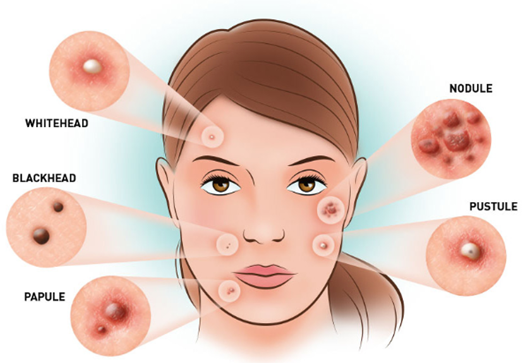| For acne-prone skin, choose oil-free, non-comedogenic (won't clog pores) cosmetics and cleansers. Look for products labeled "non-acnegenic" or containing ingredients like salicylic acid or benzoyl peroxide to help exfoliate and fight bacteria. Avoid heavy foundations, creamy concealers, and products with fragrances or oils, which can irritate and worsen breakouts. Opt for gentle, water-based cleansers to remove dirt and oil without stripping the skin's natural moisture barrier. Remember to always remove makeup thoroughly before bed and be mindful of touching your face to prevent spreading bacteria. 
Choosing the right cosmetics and cleansers for acne-prone skin requires careful consideration of ingredients and formulations. The goal is to keep pores clean, prevent breakouts, and avoid irritating already sensitive skin. Here's a breakdown:
Cleansers: - Type: Opt for gentle, non-comedogenic (won't clog pores) cleansers. Avoid harsh soaps and scrubs, which can strip the skin of its natural oils and lead to increased oil production, exacerbating acne. Look for cleansers labeled "oil-free," "non-comedogenic," or "for acne-prone skin."
- Ingredients to Look For:
- Salicylic acid (BHA): Exfoliates and unclogs pores. It's oil-soluble, so it penetrates pores effectively.
- Benzoyl peroxide: Kills acne-causing bacteria. It can be drying, so start with a low concentration and gradually increase if tolerated.
- Glycolic acid (AHA): Exfoliates the skin's surface, removing dead skin cells that can contribute to clogged pores. Use with caution, as AHAs can increase sun sensitivity.
- Gentle surfactants: Look for cleansers with gentle cleansing agents like coco-glucoside or sodium lauroyl sarcosinate rather than harsh sulfates like sodium lauryl sulfate (SLS).
- Ingredients to Avoid:
- Comedogenic oils: Mineral oil, coconut oil, and some plant oils can clog pores.
- Fragrances and dyes: These can be irritating and trigger breakouts.
- Harsh alcohols: Drying alcohols like isopropyl alcohol can irritate and worsen acne.
Cosmetics: - Non-comedogenic: This is crucial. Look for this label on foundations, concealers, powders, and other makeup products.
- Oil-free: Choose oil-free formulas to minimize pore clogging.
- Water-based: Water-based products are generally less likely to clog pores than oil-based ones.
- Minimal ingredients: Shorter ingredient lists are better, as this reduces the chances of encountering irritating substances.
- Consider formulations: Look for lightweight textures, such as tinted moisturizers or BB creams, instead of heavy foundations.
Additional Tips: - Patch test: Before applying any new product to your entire face, test it on a small area of skin (like your inner arm) to check for allergic reactions or irritation.
- Less is more: Avoid overusing products. Using too many products at once can irritate your skin and worsen acne.
- Consistency is key: Establish a consistent skincare routine and stick to it. It takes time to see results.
- Sun protection: Use a non-comedogenic sunscreen with an SPF of 30 or higher daily, even on cloudy days. This protects your skin from sun damage and helps prevent hyperpigmentation from acne scars.
- Consult a dermatologist: If your acne is severe or doesn't improve with over-the-counter treatments, consult a dermatologist. They can diagnose your specific type of acne and recommend a personalized treatment plan.
Remember that what works for one person might not work for another. Finding the right combination of cleansers and cosmetics may require some trial and error. Be patient and persistent, and you'll eventually find products that help you manage your acne-prone skin effectively.
Tags: AHA Acne Acne-Prone Skin Belzoyl Peroxide Comedogenic Oils Fragrances Gentle Surfactants Glycolic Acid Harsh Alcohols Salicylic Acid  
|  1,493
1,493  0
0  0
0  3350
3350 